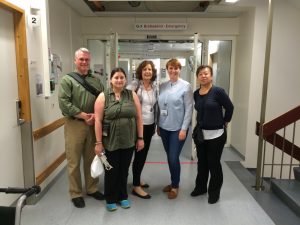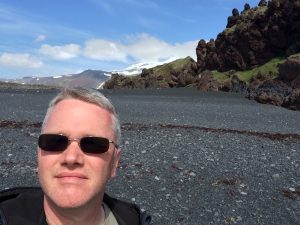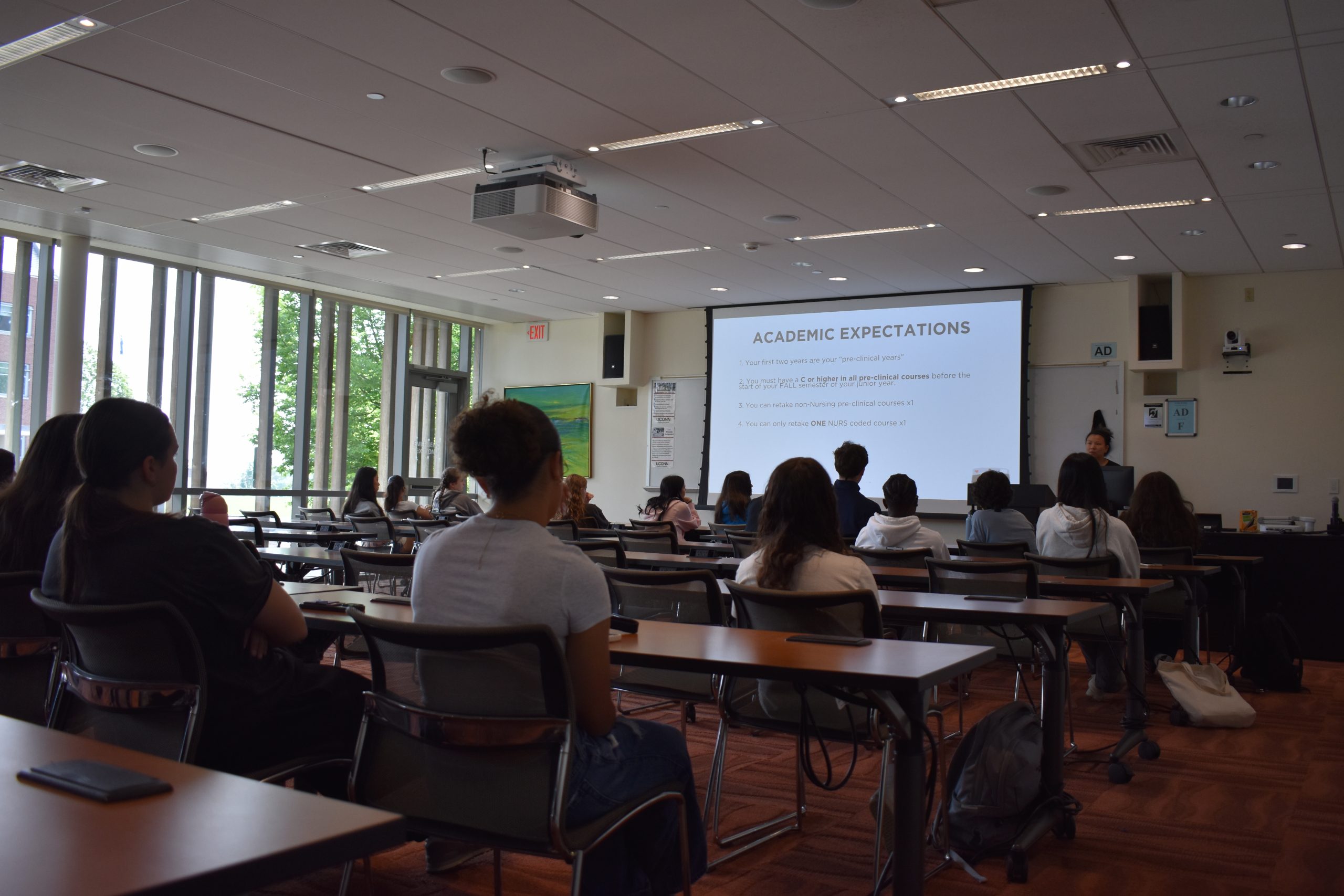George Goodrich ’09 (NUR), a student in the School of Nursing’s Ph.D. program, is researching the interpersonal exchange between nurse and patient. Specifically, his work focuses on making this interaction more compassionate, which he will use to curate nursing school curriculum on compassionate competence.
“This research, I hope, will allow me to travel back to Iceland to work with Dr. Sigríður Halldórsdóttir, who has literally written the book on nursing as compassionate competence theory,” Goodrich says.
Goodrich’s experience in nursing did not begin in Iceland, however. He was a paramedic for 10 years before he transitioned to reporting and producing for WNPR, Connecticut Public Radio. In the midst of this career change, Goodrich graduated with a bachelor’s degree in psychology from Central Connecticut State University.
In 2009, following his experience at WNPR, Goodrich entered UConn School of Nursing’s Masters Entry Into Nursing (MEIN) program (known today as the Certificate Entry Into Nursing program). This accelerated, one-year program allows individuals who hold a bachelor’s degree in a different field to pursue a career in nursing and become a registered nurse.
“I decided to apply to the UConn MEIN program because of its proximity to my home, and the ability of the School of Nursing to provide many unique clinical experiences,” Goodrich says.
After what Goodrich called “a year of the hardest work I have ever done,” he passed his NCLEX exam in 2010 and became a registered nurse.
Following graduation, he became a staff nurse at St. Francis Hospital and Medical Center in Hartford, where over the course of 10 years he worked in the cardiac surgery unit, the emergency department, the cardiovascular intensive care unit (CICU), and finally in cardiac testing.
While working as a staff nurse in Hartford, Goodrich pursued his Master of Science in Nursing through the University of Hartford, graduating in 2017. During his master’s program, he concentrated on nursing education, which led him to begin teaching as a clinical instructor at Capitol Community College and Goodwin University. He also taught at the University of Hartford, where he helped lead an educational trip to Iceland. The trip was designed to teach undergraduate and graduate nursing students about nursing education and health care in Iceland, but it also introduced Goodrich to Halldórsdóttir and her work on the science of caring.

“I had also read an article titled ‘Overcoming strangeness and communication barriers: a phenomenological study of becoming a foreign nurse,’ by H. Magnusdottir,” Goodrich says. “The author talked to foreign nurses who came to Iceland to practice.”
The article featured the comments of a foreign nurse who discussed workload, stress, staffing, and rushes of Icelandic health care: “I can sit down and have a cup of coffee with the patient and talk to him about things, where in [my country] you are running more from task to task,” the nurse told the article’s author.
Similar differences between United States health care and Scandinavian nursing stood out to Goodrich during his trip abroad. “Going there and learning about how the nurses were educated and thought about their job was very different from my experiences in the United States,” he says.
Iceland, in comparison to the United States, has universal health care with government-employed union nurses. They are taught to work in large city hospitals as well as remote clinics.
Goodrich says nurses in Iceland are very actively involved in research and have a large variety of nursing knowledge. “This is amazing for a country with only 370,000 people and about 4,000 nurses,” he says.
But Goodrich notes that there are still some flaws to nursing in Iceland.
“They still have a nursing shortage, and nurses are not as well-paid as in other Scandinavian countries, so not everything is perfect,” Goodrich says. “But their culture of taking care of their neighbors informs their nursing and health care.”
He says the trip was transformative for him: “I can talk about Iceland for a long time.”

After his return, Goodrich chose to further his education. In 2020, during the COVID-19 pandemic, he applied to the Ph.D. program at UConn School of Nursing.
“This was a huge step for me,” Goodrich says. However, he says he already felt comfortable with UConn’s doctoral program, because Yale professor Mark Lazenby — whose work Goodrich had followed during his master’s program — had recently joined the UConn faculty. Because Goodrich had used some of Lazenby’s work in his teaching, he requested Lazenby as his major advisor throughout his studies at UConn.
Goodrich credits the School of Nursing’s Ph.D. program for its wide range of specialties, especially among faculty. “Some professors have literally written the book on their research topics and methods,” he says.
Goodrich says he appreciates how Lazenby has served as an incredible mentor during his studies, pushing him to consider how compassion serves as an ethical and moral imperative in nursing.
He also credits two other faculty members for mentoring him during this educational journey: “Dr. Carol Polifroni has helped guide me though the process of nursing academia and Dr. Cheryl Beck has taught me how qualitative research can be applied to my research questions.”
While he’s still working toward his Ph.D., Goodrich already has plans for the future. “I wish to teach undergraduates the basics of nursing and continue exploring concepts in the Scandinavian science of caring,” he says, which will likely lead him back to Iceland.
Additionally, during his studies and future career, he hopes to work with other nursing experts to design curriculums on compassionate competence for nursing school programs.
“UConn School of Nursing has allowed me to look at nursing in a new way, and they let me pursue my passions in my research,” Goodrich says. “I find it challenging and invigorating.”
The UConn School of Nursing Ph.D. Program is currently accepting applications. Learn more about the program at phd.nursing.uconn.edu.
Follow the UConn School of Nursing on Facebook, Instagram, Twitter, or LinkedIn.



